European Advanced Studies Course on Microbial Resource Centres (EuroMiRC)
EuroMiRC first edition (March – July 2023)
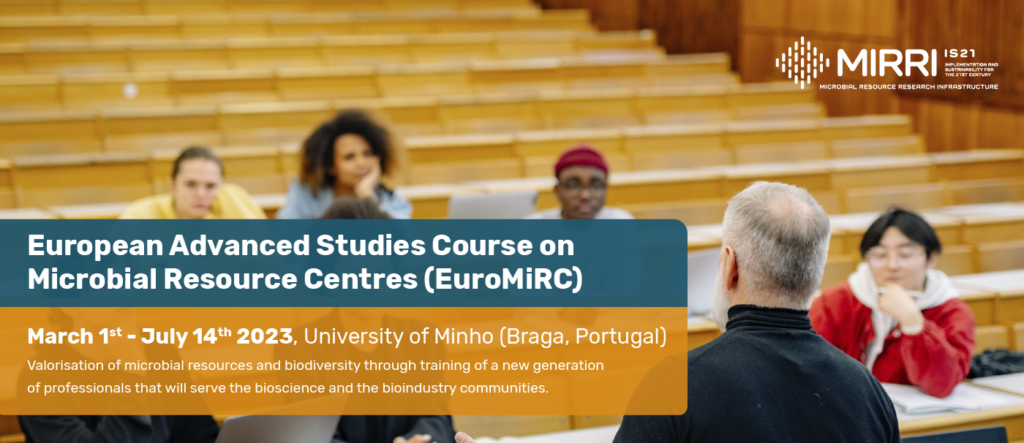
EuroMiRC aims to develop a new generation of highly qualified professionals that recognize the necessity of undergoing advanced training to acquire state-of-the-art technical and managerial skills tailored to provide and perform better services to the microbial Culture Collections or Microbial Resource Centres user communities.
The European Advanced Studies Course on Microbial Resource Centres (EuroMiRC) aims to create a new generation of highly qualified professionals that will work in microbial Culture Collections (CC) or the more advanced concept of Microbial Resource Centres (mBRCs). The prepared 30 ECTS curricular program is designed to give science professionals the skills and knowledge they need to take on greater responsibilities in the management of microbial resources. Students who successfully complete the 30 ECTS program are awarded a Diploma in Advanced Studies on Microbial Resources Centres issued by University of Minho (Braga, Portugal). Please note that EuroMiRC may be recognized for the taught part of study cycles leading to a doctoral degree but by itself it is not eligible for obtaining an academic degree.
The teaching body of this Advanced Studies Course assembles a critical mass of microbiologists with long and internationally recognized research, innovation, and education experience, belonging to different CC/mBRCs that are partners of the Microbial Resource Research Infrastructure-European Research Infrastructure Consortium (MIRRI-ERIC). The course is hosted by University of Minho (Braga, Portugal) and has the support of the following partner institutions:
- Universitat de València-Estudi General (UVEG-CECT)
- Universidad de Las Palmas de Gran Canaria (ULPGC-BEA)
- University of Latvia (UL-MSCL)
- National and Kapodistrian University of Athens (NKUA-CCUoA)
- Universita Degli Studi Di Torino (UNITO-MUT)
- Université Catholique de Louvain (UCL-BELSPO/MUCL)
- Université de Liége (ULiége-BELSPO/ULC)
- Institut National de Recherche pour l’Agriculture, l’alimentation et l’Environnement (INRAE)
- Institut Pasteur
- Westerdijk Institute – KNAW
- Institute of Agricultural and Food Biotechnology – IAFB
General objectives of EuroMiRC:
EuroMiRC intends to impact beyond the borders of CC/mBRCs by covering competencies required at different phases of the CC/mBRCs lifecycle. The EuroMiRC curricular program is designed to:- integrate scientific competencies and management skills to access, preserve and supply microbial genetic resources and other related services;
- disseminate skills on management of Microbial Resources Centres under quality control standards and in compliance with the legal frameworks;
- appraise the valorization chain of the microbial diversity long-term preservation.
Who should apply?
The EuroMiRC vision is to develop a new generation of CC/mBRCs professionals who recognize the necessity of undergoing advanced training to acquire state-of-the-art technical and managerial skills tailored to provide and perform better CC/mBRCs services to the user communities. EuroMiRC is primarily aimed at:
- Doctoral students (3rd cycle);
- Post-doctoral researchers;
- and any professionals that want to acquire high-level international and management-oriented competencies in Microbial Resources Centres.

The EuroMiRC curricular program actively encourages lifelong learning and interactions among students and CC/mBRCs staff. This will create among the alumni the sense of belonging to a professional community that shares common approaches and language and is knowledgeable in scientific and bioindustry areas in which specific CC/mBRC outperform. By the end of this course, students will be able to:
- explain the role of CC/mBRCs resources as an asset for the advancement of life sciences and biotechnology;
- describe the most frequent long-term microbial preservation methods;
- formulate strategies to implement a long-term microbial preservation plan;
- design operation strategies taking into consideration the long-term impact of quality control and risk assessment at CC/mBRC;
- implement strategies on CC/mBRC to fitness for the intended purpose under different legal, standards and regulatory requirements;
- recognize the different options to apply information technologies and data management tools to CC/mBRC.
The EuroMiRC curricular program is organized into six units that will be imparted in time as shown in the figure above:
- Responsible teacher: Nelson Lima
Curricular Unit objectives
Provide students with introductory principles and foundations of the CC and mBRC concepts, their evolution based on recommendations from different worldwide organizations, and their value as research infrastructures with impact in the life sciences and biotechnology domains.
- Learning outcomes
- Describe the origin and evolution of CC/mBRC concepts.
- Explain the value of the CC/mBRC holdings for the advance of life sciences and biotechnology.
- Analyse the impact of different worldwide and regional organizations and their initiatives on the CC/mBRC activities.
- Evaluate the role of CC/mBRC as research infrastructures.
Pedagogic materials
- Responsible teacher: Célia Soares
Curricular Unit objectives
Provide students with theoretical principles and applications of the different microbial preservation techniques and empower them for the decision-making on the use of cost-effective microbial preservation techniques.
- Learning outcomes
- Identify the different microbial preservation techniques.
- Select suitable preservation techniques according to the target microbial groups.
- Assess the quality control (QC) and quality assurance (QA) on preservation procedures.
- Design decision-support and cost-effectiveness tools to establish a plan for microbial preservation.
- Responsible teacher: Paulo Sampaio
Curricular Unit objectives
Provide a thorough overview of the most relevant guidelines, quality standards, and regulations applicable to CC/mBRCs activity, giving the students the tools to define operation strategies considering the long-term impact of quality control and risk assessment.
- Learning outcomes
- Identify different quality standards and biorisk regulations applicable for CC/mBRC operation.
- Select the most suitable guideline/standard/regulation applicable to different CC/mBRC implementation steps and operation procedures.
- Recommend strategies for CC/mBRC operation by the necessary standards and regulations.
- Determine the long-term impact of quality control and risk assessment on CC/mBRC management and sustainability.
- Responsible teacher: Nelson Lima
Curricular Unit objectives
Provide students with key aspects of CC/mBRCs organization and management, including compliance with best practices guidelines, implementation of integrated management systems, and formulation of business and financial plans.
- Learning outcomes
- Identify different models of CC/mBRC organization and management.
- Employ the best practices guidelines for CC/mBRC operation.
- Formulate business and financial plans for CC/mBRC operation.
- Evaluate the CC/mBRC fitness for the intended purpose.
- Responsible teacher: Miguel Rocha
Curricular Unit objectives
Provide students with key concepts to the establishment of an effective Data Management Plan through the use of Information Technologies to create, process, store, retrieve, and exchange data and information associated with CC/mBRCs microbial holdings.
- Learning outcomes
- Describe the context and importance of information technologies to data management.
- Differentiate available databases in terms of requirements and provided information.
- Organise data under defined protocols and standards, namely following FAIR data principles.
- Determine which data sets should be collected and integrated for a variety of processes and activities as part of a data management plan.
- Responsible teacher: Armando Venâncio
Curricular Unit objectives
To deepen knowledge in a particular applied scientific area by developing a critical case study essay.
- Learning outcomes
- Review the most relevant bibliography on a given topic to be developed.
- Categorize and compare information on a given topic.
- Write a monograph where the topic is framed, presented, and discussed.
- Synthesize and present the key take-home messages on the topic before colleagues and a jury.
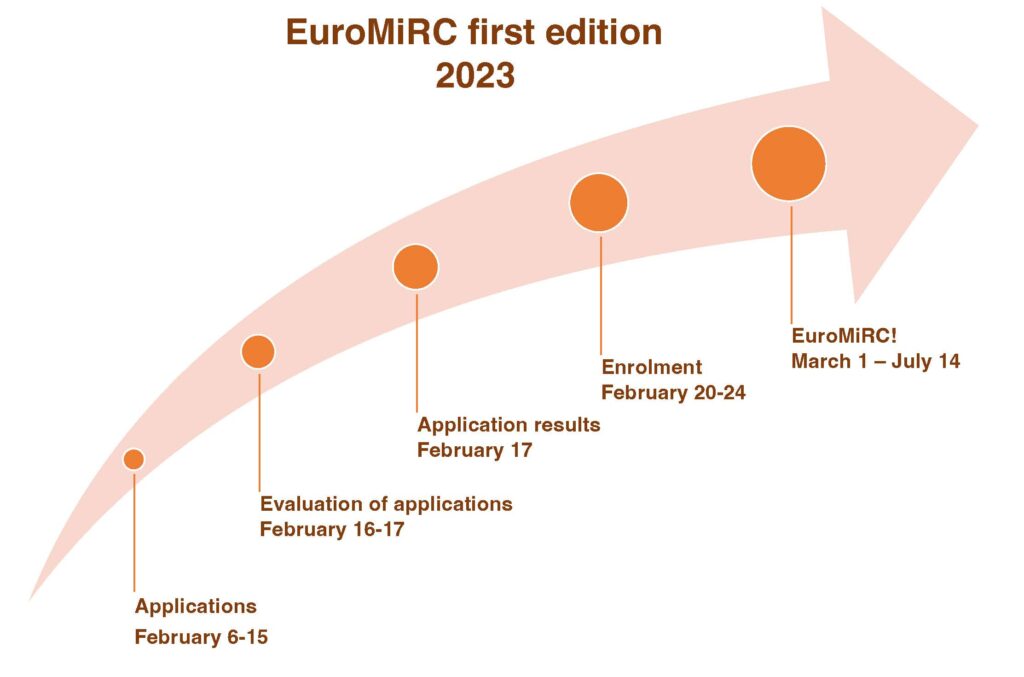
Operation regime
The course is hosted by the University of Minho (Braga, Portugal) and will take place in blended learning (b-learning) format between March 1st and July 14th, 2023. The course’s working language will be English. The face-to-face component of this course is limited to two moments:
- one week in M1 of the course, where students will have the opportunity to meet their colleagues and teachers;
- a final 2-day Seminar where the students will have the opportunity to network and present their Project in the Management of Microbial Resource Centres.
The face-to-face component will be held during working hours and will take place at the University of Minho, Biological Engineering Department, Building 7, Campus de Gualtar, Braga, Portugal.
The remaining course activities will be in the form of distance learning (e-learning), mainly after work hours. Interactive theoretical classes undertaken by the teachers (in synchronous e-learning format) and webinars given by guest lecturers (in asynchronous e-learning format) will have expository nature and will discuss the different topics covered in the syllabus. Many study materials will be available to students, including webinars, video capsules, databases, scientific papers, book chapters and books, reports, and statistics from international organizations.
- Fees
The following fees apply:
- Application fee – €20.00
- Attendance fee – €1300.00
- Registration fee (includes school insurance) – €26.00
- Completion certificate fee – €20.00
- Eligibility criteria for waived fees applyCheck them here
(Funding from the European Union’s Horizon 2020 research and innovation
program under grant agreement nº 871129)
Enrolment process
Selected applicants should fill in the Enrolment Form (here) and send it by email to access@mirri.org between February 20-24, 2023.
Eligibility
Applicants should have a master’s degree (2nd cycle of studies) in relevant areas such as Biology, Natural Sciences, Bioengineering, Biochemistry, Microbiology, Biotechnology, Biological Engineering, or similar areas. Other backgrounds, e.g., Food Sciences, Veterinary and Health Sciences, or other related scientific fields are admissible, provided the Scientific Committee gives its approval.
Applicants must demonstrate sufficient levels of English proficiency (written and spoken functional command), documented by a certificate of English language proficiency (minimum proficiency level: TOEFL low-intermediate or equivalent, through recognized organizations such as the British Council or others).
EuroMiRC is committed to create a diverse environment – we encourage everyone interested in this advanced studies course to apply.
In EuroMiRC’s first edition, fees for a maximum of 15 candidates can be waived under the IS_MIRRI21 project (funding from the European Union’s Horizon 2020 research and innovation programme under grant agreement nº 871129).
The following conditions for benefiting of waived fees apply: being of national origin or having permanent residence in an European Union Member State or Horizon 2020 Associated Country (i.e., Albania, Armenia, Bosnia & Herzegovina, Faroe Islands, Georgia, Iceland, Israel, North Macedonia, Moldova, Montenegro, Norway, Serbia, Switzerland, Tunisia, Turkey, and Ukraine).
Candidates that do not have national origin or permanent residence in an EU Member State or Horizon 2020 Associate Country are still welcome to apply to EuroMiRC. In this situation fees apply (see fee description here).
Evaluation of proposals
The ranking of candidates will be based on:
- A final average of academic training at the 2nd cycle level (20%);
- Global assessment of the candidate’s curriculum vitae and the candidate’s specific work portfolio in the area of the course (80%); priority is given to candidates from companies and partners associated with the IS_MIRRI21 project.
How to apply
Applications must be submitted by email to access@mirri.org from February 6th to February 15th, 2023.
The email must include the subject line “EuroMiRC 1st edition application_NAME_2023”.
The following documents must be attached:
- Motivation letter addressing the relevance of the candidate’s work portfolio in the area of the course and expected professional growth (max. one page);
- Detailed CV including current and previous scientific and work experience;
- Copy of the master’s degree diploma or certificate (2nd cycle level);
- Copy of certificate of English language proficiency.
The Transnational Access Pilot Programme aims to test the feasibility of access to resources and services provided by IS_MIRRI21 and standardise the procedures among the project partners. This action will be used to evaluate the reliability of the access platform for the communication and management of access requests. Two calls will be launched in January of 2021 and 2022 for the first and second TNA programmes!
More information about the TNA Pilot Programme will be available soon.
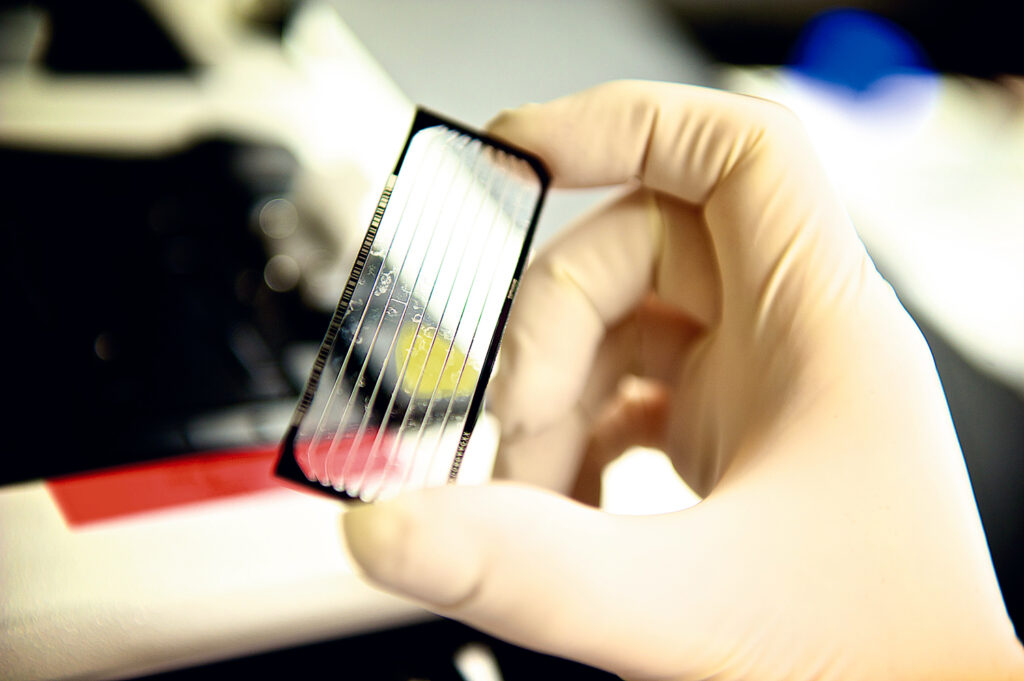
The TNA programme aims to financially and logistically support the access (on-site and remotely) of external users to the 14 IS_MIRRI21 research infrastructures across Europe to carry out their research projects. This initiative offers access to a wide variety of microbial resources, laboratories and state-of-the-art facilities and technological platforms.
The Transnational access includes:
- Technical and scientific support
- Administrative and logistic support
- Access to the products, services and facilities offered in the IS_MIRRI21 TNA catalogue
- Hands-on training needed to access the facilities
TNA funding does not include:
- Non-standard consumables
- Expenses required before or after the TNA visit
The TNA programme sponsors researchers’
- Access to the IS_MIRRI21 research infrastructures including: facilities, platforms, laboratories, standard consumables, chemicals and disposables
- Travel expenses (one round trip/person)
- Subsistence (meals and accommodation for up to 30 days, weekends included).
- Shipping costs of project materials from the IS_MIRRI21 facility to the home the institutions
The first TNA programme workshop targeted at Liaison Officers and MIRRI’s members was hosted in September 2020.
Modes of access
The TNA programme provides two means of access: on-site and remote access.
On-site access: in this type of access, the users visit the infrastructure and carry out their research projects on-site. The facility provides scientific, technical and logistic support.
Remote access: this does not involve an in-person visit of users to the infrastructures. There are two types of remote accesses:
- Shipping of strains/biological materials: the user requests a specific “Product” from the access provider (e.g. samples, strains and their derivatives such as DNA).
- Remote Services: a set of experiments are carried out at the Access Provider’s location but the user is not physically present at the installations (e.g. sample analysis and processing).
The Access Officer is the main contact person to discuss the details about the TNA application.
Access Officer
Adriana Chiarelli
TNA@mirri.org
Eligibility
The first call of the IS_MIRRI21 TNA programme applies the following criteria:
- The access must be transnational, in a country other than the country of the home institution
- Open to worldwide applications
- Applicants from beneficiaries or third-party organisations of the IS_MIRRI21 project are not eligible
- Open to PhD students, postdocs, researchers or research engineers working/studying in recognised academic or research institutions, non-profit organisations or biotechnology companies
- Masters students are not eligible
- Access is funded for a period no longer than 30 days (20 working days)
- Visits must be carried out from the signature of the contract to November 2021
- Applicants must have an active contract with their home institution during the period of the access
- Applicants must have complete support and validation of their home institution
- Only proposals submitted before the call deadline will be accepted
Applicants should contact the Access Officer for technical verification and feasibility of their proposals before application.
- Users coming from outside the EU will need to make their own visa and travel insurance arrangements.
- The applicant must be the principal investigator (main executor of the access project) in case the proposal is accepted
- Collaborations with the access provider’s staff is encouraged but not mandatory
- All data obtained during the TNA should be Open Access (except in the case of SMEs) and publications using this data should include the IS_MIRRI21 acknowledgement text
- Early career researchers, multidisciplinary proposals and applicants from non-microbiology fields are encouraged to apply
For more information regarding eligibility for the TNA programme, please review the “Guideline for applicants” found on the TNA documents area.
Access Providers
The TNA programme provides access to carry out a part of your research project in any of the 14 IS_MIRRI21 partners across Europe.
Each access provider has a Liaison Officer, who is the contact person to discuss the technical feasibility of the TNA proposal.
You will find below the list of access providers and their respective liaison officers.
| Access provider | Liaison officer(s) | |
| 🇪🇸 UVEG - CECT Spanish Type Culture Collection |
David Ruiz Arahal |
|
| 🇪🇸 ULPGC - BEA Spanish Bank of Algae |
Antera Martel |
|
| 🇬🇷 NKUA - CCUoA Culture collections of the National and Kapodistrian University of Athens |
Paris Laskaris |
|
| 🇧🇪 BELSPO - MUCL Agro-food & Environmental Fungal Collection |
Sylvie Cranenbrouck |
|
| 🇧🇪 BELSPO - IHEM Fungi Collection: Human & Animal Health |
Pierre Becker |
|
| 🇧🇪 BELSPO - ULC Cyanobacteria Collection |
Anne-Catherine Ahn |
|
| 🇵🇱 IAFB - CCIM Culture Collection of Industrial Microorganisms |
Joanna Bucka-Kolendo |
|
| 🇳🇱 KNAW - CBS Westerdijk fungal biodiversity institute |
Gerard Verkleij |
|
| 🇵🇹 UMinho - MUM Micoteca da Universidade do Minho |
Nelson Lima |
Célia Gonçalves Soares |
| 🇫🇷 INRAE - CIRM Centre International de Ressources Microbiennes |
Marwa Zaarour |
Emmanuelle Helloin |
| 🇫🇷 IP - CRBIP Centre de Ressources Biologiques de l’Institut Pasteur |
Liliana Avila Ospina |
|
| 🇱🇻 UL - MSCL Microbial Strain Collection of Latvia |
Vizma Nikolajeva |
|
| 🇷🇺 RAS - VKM All-Russian Collection of Microorganisms |
Alexander Vasilenko |
|
| 🇮🇹 UT - MUT Mycotheca Universitatis Taurinensis |
Cristina Varese |
Valeria Prigione |
TNA Catalogue
The offer of the TNA catalogue includes access to microbial resources, experimental facilities, technology platforms and the expertise and experience of their staff. Users could also carry out their projects within the workflow strategy, these research approaches were particularly designed for users who aim to deepen their research outcomes or mature their innovations.
|
Access Provider |
Infrastructure |
TNA offer |
Country |
|
PRODUCTS |
|||
|
Universitat de València – UVEG |
Spanish Type Culture Collection - CECT |
Delicate microorganisms |
Spain |
|
National and Kapodistrian University of Athens - NKUA |
Culture collections of the National and Kapodistrian University of Athens - CCUoA |
Bacteria and archaea from extreme Greek environments |
Greece |
|
Institute of Biochemistry and Physiology of Microorganisms, Russian Academy of Sciences – IBPM - RAS |
All Russian Collection of Microorganisms - VKM |
Microbial strains from extreme Russian environments |
Russia |
|
FACILITIES |
|||
|
Universidad de Las Palmas de Gran Canaria - ULPGC |
Spanish Bank of Algae - BEA |
Experimental plant for microalgae and cyanobacteria production |
Spain |
|
Netherlands Academy of Arts and Sciences-Centraalbureau voor Schimmelcultures - KNAW |
Westerdijk fungal biodiversity institute - CBS |
Heterologous expression of silent fungal gene clusters |
Netherlands |
|
Service Public Federal de Programmation Politique scientifique/Belgian Co-ordinated Collection of Micro-organisms - BELSPO-BCCM |
Agro-food & Environmental Fungal Collection - MUCL |
In vitro culture of arbuscular mycorrhizal fungi |
Belgium |
|
BELSPO-BCCM |
Fungi Collection: Human & Animal Health - IHEM |
Dermatophytes: taxonomy, identification and medical importance |
Belgium |
|
BELSPO-BCCM |
Cyanobacteria Collection - ULC |
Cyanobacterial isolation, cultivation, preservation, taxonomy and molecular characterisation |
Belgium |
|
Institute of Agricultural and Food Biotechnology - IAFB |
Culture Collection of Industrial Microorganisms - CCIM |
Identification of Alicyclobacillus sp. by molecular biology techniques |
Poland |
|
SERVICES |
|||
|
University of Minho - UMinho |
Micoteca da Universidade do Minho - MUM |
Food mycology |
Portugal |
|
Institut national de recherche pour l'agriculture, l'alimentation et l'environnement - INRAE |
Centre International de Ressources Microbiennes - CIRM |
In vitro screening of anti-infectious activities: antibacterial, antiviral and antiparasitic |
France |
|
Institut Pasteur - IP |
Centre de Ressources Biologiques de l’Institut Pasteur - CRBIP |
Analysis by BioNumerics of MALDI-TOF mass spectrometry profiles |
France |
|
University of Latvia - UL |
Microbial Strain Collection of Latvia - MSCL |
In vitro screening and testing of Minimal Inhibitory Concentration (MIC) |
Latvia |
|
Università degli Studi di Torino - UT |
Mycotheca Universitatis Taurinensis - MUT |
Metabarcoding of fungal communities |
Italy |
Find a detailed description of the TNA offers and workflows in our TNA catalogue.
IS_MIRRI21 Workflows
This initiative proposes an interconnected set of products, services and resources offered by clusters of IS_MIRRI21 partners that will allow the users to refine and mature their research and innovation projects. Through this approach, the users also benefit from the experience and expertise of several access providers. The TNA programme offers 3 workflows:
WF1
From Field Collection to Metabolites Extraction
BCCM-ULC and BEA
Belgium and Spain
WF2
Identification of taxonomically related Streptomyces strains from extreme Greek environments using mass spectrometry profiles
CCUoA and IP
Greece and France
WF3
Coupling MALDI-TOF mass spectrometry protein and molecular biology techniques to identify taxonomically related Alicylobacillus strains
IAFB and IP
Poland and France
Find a detailed description of the TNA workflows in our TNA catalogue.
How to apply
Application process
First Transnational Access call was launched between January and April 2021. The first TNA call is closed.
Selection process for the 1st TNA call in 2021
The TNA call involves 7 steps outlined in the figure below. Proposals must be submitted online through the TNA portal.

Applicants should review the TNA catalogue and identify the offer of interest. Afterwards, they should contact the access officer before the submission of the proposal. The access officer will guide the applicants throughout the process and will refer the proposals to the respective liaison officer to prepare a feasible project.
The applicants should draft a research proposal according to the parameters described in the application form. They should complete the application online and upload the requested documents.
The evaluation of proposals will be based upon the information provided by the applicant and it will be carried out taking into consideration the following steps:
- Eligibility check: The access officer will select only the proposals that fulfil all requirements enlisted in the eligibility section to continue in the evaluation process. Incomplete proposals will not be considered.
- Feasibility check: Liaison officers determine the feasibility of the projects regarding technical/logistical aspects and its coherence with the TNA offer. This is done prior the scientific review.
- Scientific review: Selection of proposals is based on peer review evaluation with excellence as the main criterion. The scientific review uses a panel-based system called User Selection Panel (USP). This panel of external high-level scientist and scholars scores the research projects and the highest ranked proposals are selected to receive funded access to the research infrastructures.
Applicants will be notified of the final decision via Email and selected proposals will be announced through the web page of IS_MIRRI21
The access should be carried out under the terms of a contract signed by the access provider and the users’ host institution. This is a legally binding document in which rights, obligations and technical and logistical details of the TNA visit/project are specified.
Within 3 weeks after the TNA access is finished, users from both on-site and remote access are required to sign a “Confirmation of Access” form, deliver an “Activity Report” and to answer a “user group questionnaire” and submit a survey about the TNA Access experience. The reimbursement of expenses incurred by the Users during the TNA Access will take place only after these documents are delivered.
The reimbursement of travel and subsistence costs will be done according to the access provider’s national laws and procedures. It is expected to be completed within the first month after finishing the access.
Submit your proposal
To submit a research proposal, users must first register in the TNA portal. Once registered, applicants must follow the specifications (select the offers and access providers, fill the forms, upload the documents requested and accept terms and conditions) before submitting the proposal. After the call is closed, applicants can monitor the status of their application via the TNA web platform and stay up-to-date about the results.
Users data will be kept private and will be accessible only by those involved in the selection procedure of the IS_MIRRI21 TNA call. Personal information is required for statistical records of our programme and reporting to the European Commission. Its use follows EU laws on data protection.
Click here to register and apply for the TNA programme.
The first TNA call is closed.

Due to third-party provider technical difficulties, the proposal submission platform for IS_MIRRI21’s first TNA call is temporarily unavailable. We expect the situation to be solved in a short time. We apologize for any inconvenience and suggest our prospective applicants to proceed with the first steps of the application process.
We are entirely available for any question at tna@mirri.org.
The proposals evaluation process
The selection of proposals for the IS_MIRRI21 TNA is based on peer review evaluation with scientific excellence as the main criterion. The TNA programme uses a panel-based evaluation system called User Selection Panel (USP). This panel of independent, high-level scientists and scholars score the proposals for funding the access to the IS_MIRRI21 partners. A minimum of 2 evaluators will be assigned to each proposal.
The applications will be scored using the following values:
| Score | Definition |
5 |
Excellent. Proposal successfully address all relevant aspects of the criterion. |
4 |
Good. Proposal addresses the criterion very well. Any shortcomings are minor. |
3 |
Fair. Proposal addresses the criterion, but a number of shortcomings are present. |
2 |
Poor. The criterion is inadequately addressed, or there are serious inherent weaknesses. |
1 |
The proposal fails to address the criterion or cannot be assessed due to missing or incomplete information. |
The evaluation and selection of proposals will be carried out under the principles of excellence, transparency, fairness and impartiality, confidentiality, efficiency, ethics and research integrity considerations and according the following criteria:
Ground-breaking nature and potential impact of the project
- How many of these challenges are addressed by the current proposal: (1) environmental, (2) food and feed, (3) biodiversity, (4) innovation and (5) health.
- Are the objectives ambitious and beyond the state of the art? Do they propose original concepts, approaches or development between or across disciplines?
- Is the proposed research high-risk/high-gain? There is a higher-than-normal risk that the research project does not entirely fulfil its aims but if successful the payoffs will be very significant.
Scientific Approach
- Are the proposed research methodologies and the access arrangements appropriate to achieve the goals of the project?
- Does the proposal involve the development of novel methodologies or the use of technology non-commonly applied in the field?
- Are the uses of the facility, the proposed access planning, resources and applicant’s commitment adequate and properly justified?
Impact
- Could the outputs of this research be envisaged to have an impact on: future research or technology?
Intellectual capacity and creativity of the applicant
- Does the applicant have the required scientific expertise and/or capacity to successfully execute the project?
- To what extent the new competences and skills that will be acquired during the access are relevant to the researcher’s existing professional experience or will give a boost to her/his future career?
Access
Support provided before, during and after the access
The access officer is the main contact for the applicants during the TNA call. She will assist the applicants during the application, evaluation and reporting process.
Logistical support
The facilities’ local staff will advise and assist users with logistics including bookings, travel itineraries, on-site accommodation and local transportation.
Technical support
Users will have access to a laboratory, services, machines, products and assistance during the TNA. The access provider will guarantee the access to core facilities, machines, resources and data necessary to carry out the TNA project. If needed, training will be provided for the proper and safe use of the facility.
In case of remote access, the access provider will guarantee the implementation of user access programme (which are the research activities and logistics previously agreed in the user access contract t).
When shipping of material is required for the project execution at the access provider, the user should take charge of the shipping and cover the costs. When shipping of material produced during the TNA visit is required, the access provider will handle the shipping and its costs to the users’ home institution.
Scientific support
The facilities provide with basic equipment to the users who request on-site access. Experimental support includes the supply of standard disposables and the use of standard laboratory. The applicants should list in the project proposal the equipment and disposables needed for executing their work. The access provider specifies what items in this list constitutes “standard” and which are not. Items outside the aforesaid definition of “standard”, such as unusual and/or expensive consumables are not included in the access and either must be supplied by the user or ordered by the access provider and then charged to the user.
Research staff from the access provider might collaborate with the users. In that case, users and collaborators at the facility share all foreground knowledge developed during the TNA visit. Both should specify, in a signed agreement, which relevant background knowledge will be excluded from such collaboration.
MTA and User Access Contract
An MTA [Material Transfer Agreement] (for shipping of strains/biological material) or a “user access contract” (for on-site access and remote services) should be agreed between the user and the access provider specifying the terms and conditions of the access.
The user access contract is a legal document that specifies the rules, obligations, logistics and technical details of the TNA visit. This also specify the administrative procedures for the reimbursement of travel and subsistence expenses. The user will negotiate details with the liaison officer or the legal office from the access provider.
Users are encouraged to check in advance with the liaison officer the reimbursement procedures required by the access provider.
The contract is signed by the legal representatives of the access provider, the user’s home institution and the user.
The project starts officially as soon as the contract is signed according to the dates and conditions specified in the document.
Reporting
After completion of the project, the users are requested to provide a confirmation of access and a TNA activity report within 3 weeks after the access via Email. Additionally, a User group questionnaire and a feedback survey must be filled by the users to evaluate and improve the quality of access. These questionnaires should be completed within 2 weeks after the end of the TNA visit through the on-line reporting portal. Failure to provide these documents will result in no-reimbursement of the entire access costs.
Confirmation of access
A confirmation of access form should be downloaded from the TNA portal on https://ismirri21.mirri.org/project- platforms/tna/. Users and access providers should complete and sign this form for each access provider visited during the TNA. The document (in PDF format) should be delivered to the access officer via Email within 2 weeks after the end of the TNA visit. The confirmation of access is mandatory for the on-site and remote access.
TNA activity report
A form of the TNA activity report should be downloaded from the TNA portal on https://ismirri21.mirri.org/project- platforms/tna/. Users should describe in this document the objectives, methods, and preliminary results of the research project carried out during the TNA visit and deliver it to the access officer via Email. This report is mandatory only for the on-site access and the remote services.
One document for each access provider visited during the access should be filled and signed by the user within 3 weeks after the end of the TNA visit.
User group questionnaire and TNA Feedback survey
Each user from a project funded by an EU Research Infrastructure is requested to complete the “User Group Questionnaire”. The questionnaire enables the Commission to evaluate the Research Infrastructures Action, to monitor the individual grant agreements, and to improve the services provided to the scientific community.
Please complete the User group questionnaire within 2 weeks after the end of the TNA visit.
For the TNA feedback survey, the user will receive a link to answer a questionnaire within 2 weeks after the end of the TNA visit. Through this user feedback, the users will express their outcomes and experiences of their access at the visited infrastructures. These exchanges will give rise to improvements for the future TNA calls of the IS_MIRRI21 project.
Dissemination of results and acknowledgements
IS_MIRRI21 follows the FAIR (Findable, Accessible, Interoperable, Reusable) and Open Access principles. All projects receiving Horizon 2020 funding are required to make sure that any peer-reviewed journal article they publish is openly accessible, free of charge (article 29.2. Model Grant Agreement).
Scientific research data, which is the data underlying publications and/or other data (such as curated but unpublished datasets or raw data) should be Open Access when there is no case of conflicts of interests regarding commercialisation of the scientific information, Intellectual Property Rights (IPR), privacy concerns and security. SMEs are excluded from this rule.
Acknowledgements
Any subsequent publication resulting from the work carried out in the framework of the IS_MIRRI21 TNA programme must acknowledge the support of the IS_MIRRI21 project and the funding from the European Union’s Horizon 2020 Research and innovation programme under the grant agreement N° 871129.
Researchers awarded in the first MIRRI/IS_MIRRI21 TransNational Access (TNA) call 2021
We are pleased to announce the first four users awarded by MIRRI's IS_MIRRI21 project during the 1st TransNational Access (TNA) call:
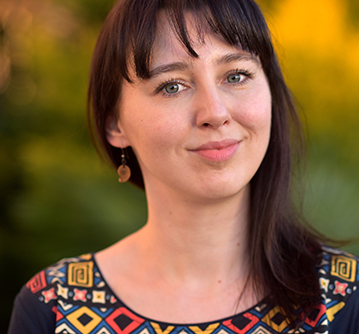
Roksana Majewska
Postdoc researcher at the North-West University South Africa (South Africa)
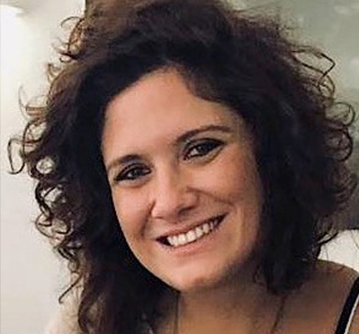
Assunta Saide
Postdoc researcher at Stazione Zoologica Anton Dohrn (Italy)

Agapi Doulgeraki
Assistant researcher at Institute of Technology of Agricultural Products, ELGO-DEMETER (Greece)
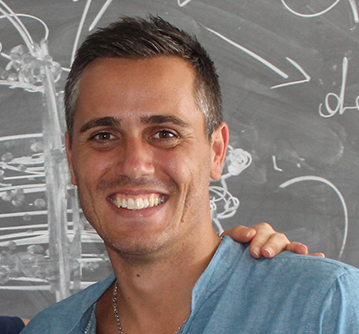
Fortunato Palma Esposito
Postdoc researcher at Stazione Zoologica Anton Dohrn (Italy)
